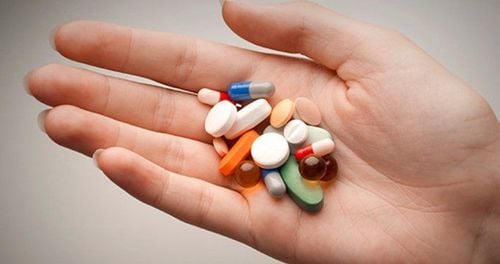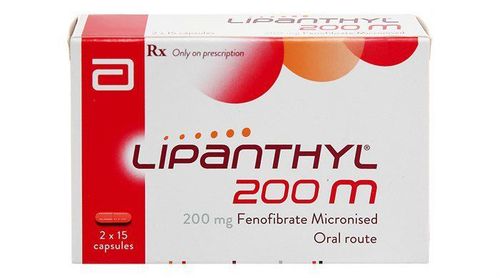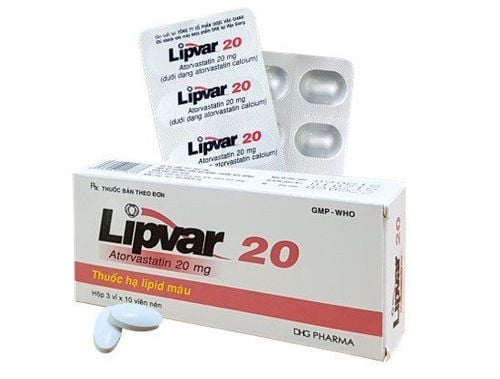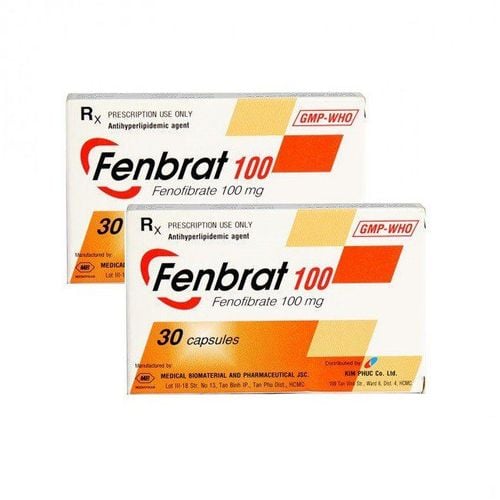This is an automatically translated article.
Hafenthyl Supra 160mg is made in the form of tablets, with the main ingredient being Fenofibrate. The drug is used in the treatment of severe hypertriglyceridemia and mixed hyperlipidemia.
1. What is Hafenthyl Supra 160mg?
1 Hafenthyl Supra 160mg tablet has the main ingredient is Fenofibrate 160mg and other excipients. Fenofibrate is a derivative of fibric acid that has been shown to lower blood lipids in humans. Fenofibrate acts indirectly through the activation of the PPARα receptor, increasing lipolysis, eliminating potentially atherogenic triglyceride-rich particles in the plasma by activating lipoprotein lipase, reducing the synthesis process. apoprotein C-III.
Fenofibrate can reduce blood cholesterol levels by 20 - 25%, and blood triglycerides by 40 - 50%. It helps to lower the cholesterol of LDL, VLDL (the components that cause atherosclerosis) and increases the cholesterol of HDL, reducing the risk of coronary heart disease. At the same time, Fenofibrate also reduces blood uric acid by increasing uric acid excretion through the urine.
Indications for use of Hafenthyl Supra 160mg:
Treatment of severe hypertriglyceridemia, with/without low HDL cholesterol; Treatment of mixed hyperlipidemia when statins are contraindicated or intolerant of patients; Treatment of mixed hyperlipidemia in patients at high CVD risk in combination with a statin, when triglycerides and HDL-cholesterol have not been adequately controlled. Contraindications to using Hafenthyl Supra 160mg:
People who are allergic to Fenofibrate or other ingredients of the drug; Patients with hepatic impairment (including biliary cirrhosis and persistent liver function abnormalities); People with gallbladder disease; Patients with severe renal failure (eGFR < 30ml/min/1.73m2); Patients with acute or chronic pancreatitis (except acute pancreatitis due to hypertriglyceridemia); The patient has photosensitivity or photosensitivity during the use of fibrate or ketoprofen.
2. Usage and dosage of Hafenthyl Supra 160mg
How to use: Orally, the patient should take the drug with meals. Accordingly, patients need to follow a suitable diet before taking the drug and continue until they are using the drug. It is necessary to monitor the response to treatment through quantification of serum lipid indices. If an adequate response to Hafenthyl Supra 160 mg has not been achieved after approximately 3 months, additional or alternative therapy should be considered.
Dosage:
Adults: Take 1 tablet/day. Patients who are taking Fenofibrate 200mg capsules can switch to Hafenthyl Supra 160mg tablets without any dose adjustment; Elderly (over 65 years old): No need to change the dose, use the usual dose unless renal function declines (glomerular filtration rate eGFR < 60ml/min/1.73m2); Patients with renal failure: Severe renal failure (eGFR < 30ml/min/1.73m2): Do not use drugs; Mild and moderate renal impairment (eGFR 30 - 59ml/min/1.73m2): Fenofibrate dose should not exceed 100mg standard form or 67mg micro form per day; If during patient monitoring, the eGFR index continuously decreases < 30ml/min/1.73m2, the drug should be stopped; Patients with liver failure: Do not use Hafenthyl Supra 160mg due to insufficient research data; Children: There are no data on the safety and efficacy of Fenofibrate in children under 18 years of age, so it should not be used in this population. Overdose: When using fenofibrate overdose, the patient should be treated symptomatically and supportively. In the event of an emergency, call 911 and bring the patient to the hospital immediately.
Missed dose: If you miss a dose of Hafenthyl Supra, the patient should take it as soon as possible. If it is almost time for the next dose, the patient should skip the missed dose and take the next dose at the scheduled time.
3. Side effects of Hafenthyl Supra 160mg
Some side effects patients may encounter when using Hafenthyl Supra 160mg include:
Common: Abdominal pain, nausea, vomiting, flatulence, diarrhea, increased transaminases, increased homocysteine levels in the blood; Uncommon: Headache, thromboembolism (deep vein thrombosis, pulmonary embolism), pancreatitis, gallstones, hypersensitivity (itchy skin, rash, urticaria), muscle disorders (muscle spasms, weakness) myalgia, myalgia, myositis), sexual dysfunction, increased serum creatinine. When experiencing side effects of Hafenthyl Supra 160mg, the patient should stop taking the drug and immediately notify the doctor for timely treatment.
4. Be careful when using Hafenthyl Supra 160mg
Before and while using Hafenthyl Supra 160mg, patients should note:
It is necessary to check the patient's liver and kidney function before starting treatment with Fenofibrate; Secondary causes of hyperlipidemia such as uncontrolled type 2 diabetes, nephrotic syndrome, obstructive liver disease, hypothyroidism, dysproteinemia, alcoholism or drug therapy,... should be treated. adequate treatment before using Fenofibrate; Identify causes of hypercholesterolemia associated with drug therapy such as beta-blockers, diuretics, progestogens, estrogens, immunosuppressants, combined oral contraceptives, protease inhibitors to obtain appropriate treatment interventions; An increase in transaminase levels when taking Hafenthyl Supra 160mg may occur. In most cases, the increase is only temporary with a small degree and no symptoms. Patients should monitor transaminase levels every 3 months for the first 12 months of treatment, periodically thereafter. Patients should be alerted to elevated transaminase levels and treatment should be discontinued if AST and ALT levels rise more than 3 times the upper limit of normal. When signs of hepatitis (pruritus, jaundice) and the diagnosis are confirmed, treatment with fenofibrate should be discontinued; Patients using Hafenthyl Supra 160mg may develop pancreatitis. This event may result from treatment failure in patients with severe hypertriglyceridemia or be secondary to stone formation, biliary sedimentation, and bile duct obstruction; Patients taking fibrates and other lipid-lowering agents may experience muscle toxicity, including rhabdomyolysis, with/without renal failure. This incidence is increased if the patient has hypoalbuminemia and pre-existing renal failure. Patients with risk factors for muscle disease are higher if they are over 70 years old, have a personal or family history of inherited muscle disorders, hypothyroidism, kidney failure, drink a lot of alcohol. In these subjects, care should be taken when treating them. If the patient has diffuse myalgia, cramps, muscle weakness, myositis, increased CPK index (concentrations higher than 5 times the upper limit of normal), muscle toxicity may be present. Hafenthyl should be discontinued. Supra 160mg ; The risk of myotoxicity may be increased if Hafenthyl Supra is co-administered with other fibrates or HMG-CoA reductase inhibitors, particularly in patients with a history of myopathy. Therefore, it is necessary to pay attention when combining drugs, closely monitor the risk of myotoxicity; Hafenthyl Supra 160mg should not be used in patients with severe renal impairment, use with caution in patients with mild to moderate renal impairment. Dosage should be adjusted in patients with eGFR 30 - 59ml/min/1.73m2. Patients receiving fenofibrate monotherapy or in combination with statins may experience reversible increases in serum creatinine. Serum creatinine elevations are usually stable over time, tending to return to normal on discontinuation of therapy; If, after 3 - 6 months of treatment with Hafenthyl Supra, blood lipid levels do not decrease, then an alternative or complementary treatment should be considered; When using Fenofibrate, patients with cholestatic cirrhosis or gallstones may have biliary complications; It is necessary to regularly check the blood count during the use of Fenofibrate; Hafenthyl Supra 160mg contains lactose, not for people with Lapp lactase deficiency, galactose intolerance or glucose - galactose malabsorption; Due to the unknown potential for fetal toxicity of Hafenthyl Supra 160mg, it should be used with caution in pregnant women, only if approved by a doctor after weighing the benefits and risks; It is not known whether Fenofibrate and its metabolites pass into breast milk, so this drug should not be used in nursing mothers.
5. Drug interactions Hafenthyl Supra 160mg
Some drug interactions Hafenthyl Supra 160mg include:
Fenofibrate (the main ingredient of Hafenthyl Supra 160mg) increases the effect of oral anticoagulants, which may increase the risk of bleeding. Therefore, the dose of oral anticoagulants should be reduced by approximately 1⁄3 at the start of dosing and the dose should be adjusted gradually based on monitoring of the INR; When Fenofibrate is co-administered with cyclosporin, patients may experience severe reversible impairment of renal function. Therefore, renal function should be closely monitored, treatment with fenofibrate should be discontinued in case the patient's laboratory parameters are seriously changed; There is an increased risk of toxicity when fenofibrate is co-administered with HMG-CoA reductase inhibitors or other fibrates. This combination should be used with caution, and patients should be closely monitored for signs of muscle toxicity. There is currently no evidence that fenofibrate affects the pharmacokinetics of simvastatin; When fenofibrate was used concomitantly with Glitazone, there were some patients with a reversible paradoxical decrease in HDL-cholesterol. Therefore, should monitor HDL-cholesterol levels when combining drugs, stop using 1 of 2 drugs above if HDL-cholesterol levels are too low; Patients taking fenofibrate concomitantly with drugs metabolised by CYP2C19, CYP2C9 and CYP2A6 with narrow therapeutic index should be carefully monitored and dose adjusted if necessary; Fenofibrate stimulates mitochondrial multifunctional oxidizing enzymes involved in fatty acid metabolism, which may interact with drugs metabolized by these enzymes. When being treated with Hafenthyl Supra 160mg, the patient should follow all the instructions of the doctor. At the same time, patients must combine with a low-lipid diet, take drugs for a long time and have to monitor their health regularly. To ensure the effectiveness of treatment and avoid unwanted side effects, patients need to strictly follow the instructions of the doctor, professional pharmacist.
Follow Vinmec International General Hospital website to get more health, nutrition and beauty information to protect the health of yourself and your loved ones in your family.
Please dial HOTLINE for more information or register for an appointment HERE. Download MyVinmec app to make appointments faster and to manage your bookings easily.













